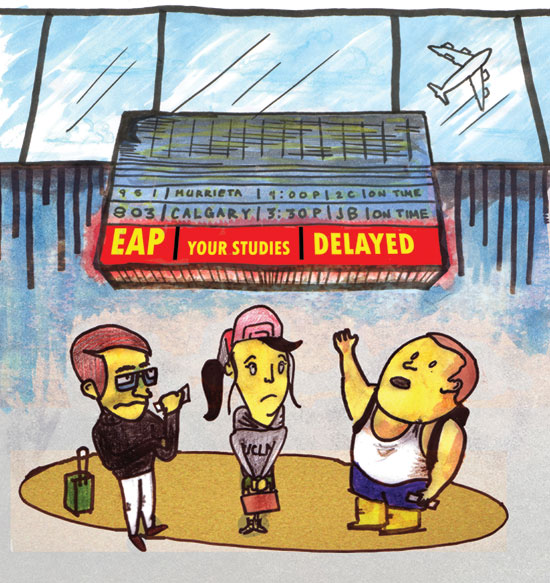As the year progresses, even more cuts are being made to UC programs. The most recent victim is the UC’s Education Abroad Program, which will lose $3 million from general funds.
In light of budget issues, these cuts are necessary. Though necessary, the University of California must ensure that students with the highest interest in the program, such as those in international studies or language majors, can still study abroad. EAP strives to be as affordable as possible by providing financial aid. With financial aid packages available to many students, most can find something that will work for them.
To offset the loss of funds, UCLA’s EAP will increase fees by an average of $300 a student. Relative to the overall cost, an average of $300 may not seem like a very large increase. Unfortunately, with other fees increasing, a certain segment of students, those with incomes too high for financial aid, but lacking the funds for a term overseas, could have an important program pushed even further out of reach.
For students in majors relating to international studies or languages, these increases can be the most detrimental. These students’ studies rely not only on classroom learning, but also on immersion. Instead of looking at studying abroad as a supplement to their education, it should be viewed as a component of it.
Science students don’t merely read textbooks, they do labs to get hands-on experience. Similarly, a student in East Asian studies can’t learn the intricacies of a culture without studying in East Asia.
This argument should not indicate that studying abroad is unimportant for other students. Many students have a valid interest or reason to study abroad. For instance, while studying abroad may not be as essential for a student studying political science as for a student studying French, traveling to France could still provide the student with valuable insight into French government and culture.
Learning about other cultures is something that promotes important international discourse and should be protected.
The situation is that, for certain students, studying abroad is essential to getting a job or adequately understanding the topics they are studying. Many students who study abroad use that quarter to find a job in the place they are studying; for these students, an increase in fees could be harmful to their job prospects in addition to their education.
Students majoring in linguistics, area studies, international development studies, global studies or foreign languages should simply pay the current fee, because for these students, studying abroad is imperative to receive a quality education for their majors. For students in majors that would benefit from the EAP but do not necessarily require studying abroad, the fees should be increased to cover the $3 million decrease.
Some might argue that it is unfair to have a different set of fees for different types of students. However, there are certain students who benefit most from studying abroad.
The UC, because it pays for most of the chemicals for a chemistry student’s lab, should not require a student for whom studying abroad is necessary to pay for most of the fee increase. Each major has certain costs associated with its upkeep, and unfortunately, some are more expensive than others.
South Campus majors require large investments in supplies and research, yet it is not often discussed that a science student should pay more than a humanities student. The dire importance of the program for some necessitates that we discriminate costs between majors, because the program is more than a luxury for these students, it is a necessity whose expense should be borne by the university.
By ensuring that students who benefit most from the program do not suffer from fee increases, we remove the risk of harming those who need it most. Under current circumstances, the EAP program seems to have no choice but to increase fees. However, there should be some thought about reinstating the $3 million in cut funds at the UC-wide level. With the number of international studies majors decreasing and UC classes offered dwindling, the EAP is not the best place to cut funding.
E-mail dfeeney@media.ucla.edu. Send general comments to viewpoint@media.ucla.edu.
